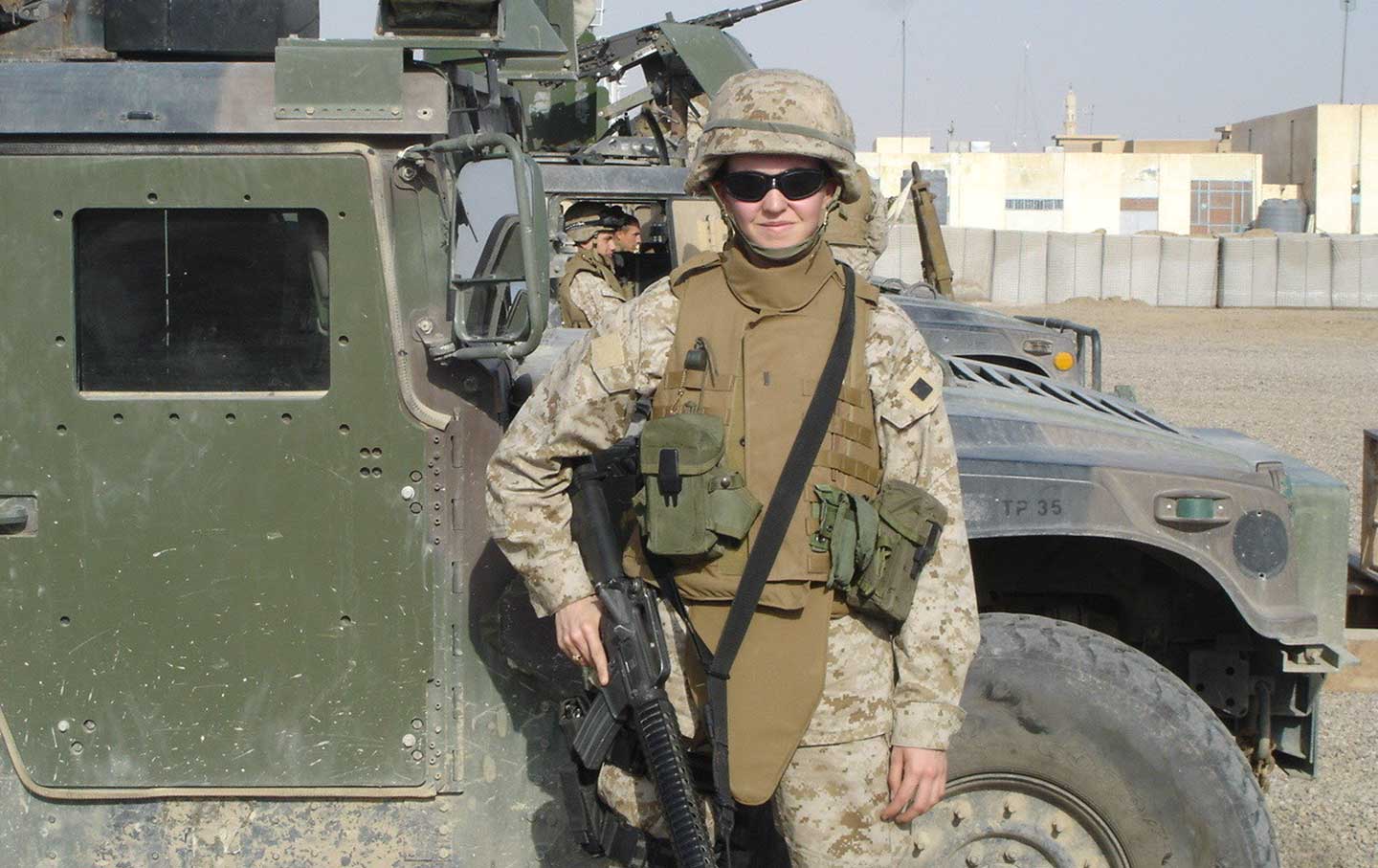There Are Two Parties: Republicans and Cowards
In this week’s Elie v. U.S., The Nation’s justice correspondent digs into the fallout from the Democrats’ shutdown letdown. Plus: why the SNAP fight is far from over—and Kim Kardashian shouldn’t become a lawyer.

Kim Kardashian attends a discussion on criminal justice reform hosted by Vice President Kamala Harris on April 25, 2024.
The SNAP saga is over for now. Kind of. The Trump administration used the government shutdown to cancel funding for the Supplemental Nutrition Assistance Program. The move would have left 42 million people hungry for the holidays. The administration was sued, and lost in the lower courts (as it almost always does), but the Supreme Court swooped in and defended Trump’s cruel policies (as it almost always does). The high court ruled that Trump could ignore lower court orders and cut off food assistance, allowing people to suffer and starve, pending a full Supreme Court hearing at some later date.
But then, the shutdown ended (more on that later). On Thursday, Solicitor General John Sauer officially withdrew the administration’s appeal. Sauer says the new budget deal “fully funds SNAP through the end of the fiscal year.” The new deal renders the previous lawsuits “moot,” meaning the court does not have to decide on whether Trump can let millions starve.
Crisis averted? Not quite. While the budget deal removes the immediate specter of Trump cutting off SNAP for 42 million people, lawsuits about other changes Trump wants to make to the program continue. Before the shutdown, Trump was poised to expand the work requirements for SNAP, a move that will churn millions of people out of the program and condemn them to empty tables this winter. Lawsuits trying to stop those changes are still pending.
I will never understand why we’re not all able to agree that we should provide food assistance to hungry people. We are the wealthiest nation on earth. Nobody should be hungry (also, nobody should be homeless, and nobody should be unable to receive medical care). I will never understand why millions and millions of well-fed, taxpaying Americans think that starvation is an acceptable consequence for the failures of capitalism.
We do not live in the state of nature. We are not chimpanzees. Thanks to advances in agricultural science—things that would be viewed as literal miracles for 99 percent of human history—we have enough food for everybody. Expecting the government to provide food assistance to those who need it is not a political position; it’s a moral one.
And yet, we have to battle over the extension of SNAP benefits every single year a Republican is in charge, and most years Democrats are. Hunger should be a solved issue in the United States. But it never will be. Because bad people exist and hold power.
The Bad and the Ugly
- Google has chosen to help Trump conduct illegal mass deportations. It’s hosting software that allows ICE to use facial recognition technology to identify immigrant targets, but it’s removing software that helps immigrants and activists track where ICE is on the prowl.
- The Supreme Court will likely rule that prison officers can forcibly shave the heads of people in prison, in violation of their religious beliefs, without having to pay damages. That might surprise people who think the Republican court is all about religious freedom, but the plaintiff in this case is Rastafarian—and people who have been paying attention know that the court’s respect for religion only applies to the Jesus crowd.
- The head of the Boston University Young Republicans has been bragging on social media about how he called ICE to urge it to apprehend nine immigrants working at a car wash. All of the people had work permits but were detained and disappeared before they could go to their lockers to show their documentation. The BU student is from the UK, by the way.
- Speaking of the UK, the Independent Workers Union of Great Britain has filed a complaint against Rockstar Games, makers of the immensely popular Grand Theft Auto series, over alleged union busting. Rockstar fired 30 workers for allegedly sharing “confidential” information about the upcoming video game in a Discord channel. But the channel was being used by workers and union reps fighting for better conditions at the company.
- To round out our British news segment: Trump is threatening to sue the BBC over its editing of his January 6 coup d’état speech. The BBC apologized and those responsible stepped down, but it hasn’t put more money in Trump’s pockets, so he’s angry. If I were a conspiracy theorist, I’d say there is a secret plot, hatched by Stephen Miller and Steve Bannon, to make sure Great Britain is just as shitty as the United States, so that people like me, who only speak one language, have one place fewer to go.
Inspired Takes
- Look, I’m not going to write a whole thing about the Epstein files just because the “age of consent” is a confusing legal concept for Megyn Kelly. But as The Nation’s Chris Lehmann explains, this should be really, really bad for Trump and the cabal of pedo-curious people who surround him.
- This piece in The Nation, from former John Fetterman consultant Leah Abrams, really captures the utter betrayal that is the Fetterman experience.
- Adam Serwer explains the intersection of Dungeons & Dragons, racism, and Elon Musk. It’s a fantastic piece, and it scratches at something that has been one of the greatest disappointments of my adult life: the way “nerd culture” has been completely co-opted by racists and misogynists. See, when I was a kid, being into things like D&D and Star Wars and video games felt almost subversive. It was, for me, a rejection of toxic masculinity and an opportunity to find community with guys who weren’t on the football team (even though I was totally on the football team) and rejected the prevailing “might makes right” tendencies of adolescent boys. But now, as many of these once-nerds have risen to become captains of industry and the purveyors of culture, I see that the “nerds” were no better or different from the “jocks.” They were not inspired by a greater or deeper respect for women or vulnerable people. They wanted to do all the horrible things the other guys wanted to do; they just weren’t athletic enough to make the football team. There were signs: The emotional climax of the movie Revenge of the Nerds is a literal rape scene. I didn’t understand how horrible it was at the time (in fairness, I was probably 8 when I saw the movie). I didn’t believe “men are shit” when I was 15, or even 25. But I do now.
Worst Argument of the Week
The brain-droppings of Senate Democrats. Specifically the brain-droppings of the eight Democrats who helped the Republicans end the shutdown, but really almost all of them, including leadership. It is difficult to identify a group of people as singularly spineless as Senate Democrats, unless you expand your definition of “people” to include Trump cabinet appointments.
Popular
“swipe left below to view more authors”Swipe →To put everything in the broadest possible context: Senate Democrats refused to give Republicans the votes they needed to fund Donald Trump’s dread priorities unless the Republicans agreed to include basic protections for federal workers and healthcare subsidies. Republicans refused to compromise and shut down the government. After 43 days, with Republicans still refusing to compromise, Democrats gave up the fight, and Republicans got everything they wanted. The end.
The arguments for this feckless display range from “Trump was too strong” to “But the Republicans promised to talk with us in the future.” I’ve fought harder and longer to defend my lunch money than these Democrats fought to defend the country.
Still, I long ago came to expect Democratic cowardice. What’s really shocking here is the political malpractice of it all. Democratic candidates just ran the table in an off-year election. The party achieved major victories up and down ballots all over the country. That is all the political press should be talking about (that and, you know, the president’s close relationship with a pedophile). We should be getting story after story about how Democrats are “on the march” and that the resistance to Trump is stronger than ever.
Instead, we’re being treated to another week of stories about how the Democrats are weak and pathetic. Because they are weak and pathetic. Not all of them, of course, but more than enough to drag the entire project down to their boot-licking level.
When future alien archeologists discover the fall of America in the early 21st century, they will not make a distinction between Democrats and Republicans. They’ll just see the difference between the cowards and the courageous.
What I Wrote
I wrote about how the Democrats’s love of the Senate filibuster was the hidden reason they caved and gave Republicans everything they wanted. After I wrote it, Senator Tim Kaine opened his complicit mouth and pretty much confirmed everything I said.
In News Unrelated to the Current Chaos
Kim Kardashian failed the California bar exam. There’s no shame in that. The California bar exam is hard: Only 54.8 percent of people who took the July 2025 exam passed. Passing the bar is not an indication of intelligence or of lawyering skills. Instead, like all standardized tests, the test is really about how good you are at taking standardized tests.
I wouldn’t ordinarily note one person’s struggles with a notoriously hard test but for the way Kardashian has approached this particular challenge. Kardashian, who does not have a bachelor’s degree, also did not attend law school. She’s eligible to sit for the bar through California’s “Law Office Study Program.” It allows people to apprentice themselves to a lawyer for a number of hours, and then try to take and pass the test if they can hack it. It’s a very old way of becoming a lawyer, even though the only person I know of who has ever done it that way was Abraham Lincoln. Again, I impute no shame to people who cannot afford to go to law school so they instead try to work themselves into the profession.
But here’s the thing: Kim Kardashian can afford to go to law school! Money is not her problem. She keeps running around social media jabbering about how “committed” she is to following her dream, but somehow that commitment doesn’t extend to… going to class?
Speaking of money, it is wildly unclear why Kardashian needs to become a lawyer in the first place. She can afford attorneys. She can afford armies of attorneys. There is no legal issue she cares about that she cannot hire really good lawyers to pursue. It’s all well and good for a rich person to want to educate themselves, but, again, Kardashian is not willing to educate herself at any of the literally hundreds of schools designed specifically to educate her. The whole thing is this weird vanity project where she seems to want the status of “being a lawyer” without, you know, the education usually associated with that title. It’d be like if I wanted to become an astronaut but didn’t want to learn all that pesky math and physics stuff. “I played 1,000 hours of Kerbal Space Program, now let me fly the rocket ship.”
As my friend Joe Patrice explains, all of this is kind of frustrating, because Kardashian actually does good things in the legal space with her money and celebrity. She has been a stout advocate for criminal justice reform and has literally freed people from prison. I’d take her as a senator any day over, say, Tim Kaine, and I’m not joking about that. She doesn’t need to pass a stupid test to help.
There are thousands and thousands of lawyers who did go to law school, did pass the bar, and do want the same things Kardashian wants. But they can’t make a good living—one that pays for their massive law school debts—while working in criminal justice reform. I know some of these people. They end up as insurance lawyers or bank lawyers or tort lawyers, because that’s where the money is. Kardashian could hire some of these people—at wages that allow them to pay back their debts—and be a more righteous force for good than she ever could be with a silly “Esquire” after her name.
I don’t understand celebrity culture, and I could never put myself in the mental headspace of a person who is famous for being famous. But if you are a wealthy person reading this, and you are thinking of becoming a lawyer to join the front lines in the fight for whatever you care about, my advice is “don’t.” Hire the lawyers. Pay them well. Then tell them what you want them to do. That is the highest, best use of your time and money. Leave studying “law” to those of us whom… nobody wants to see in a sex tape.
***
If you enjoyed this installment of Elie v. U.S., click here to receive the newsletter in your inbox each Friday.
Your support makes stories like this possible
From Minneapolis to Venezuela, from Gaza to Washington, DC, this is a time of staggering chaos, cruelty, and violence.
Unlike other publications that parrot the views of authoritarians, billionaires, and corporations, The Nation publishes stories that hold the powerful to account and center the communities too often denied a voice in the national media—stories like the one you’ve just read.
Each day, our journalism cuts through lies and distortions, contextualizes the developments reshaping politics around the globe, and advances progressive ideas that oxygenate our movements and instigate change in the halls of power.
This independent journalism is only possible with the support of our readers. If you want to see more urgent coverage like this, please donate to The Nation today.








